Robert Pipkin's Blog: Stuff I Put In My Head, page 2
May 3, 2016
StoryADay, Day 3 - My First Drabble
Today's StoryADay challenge was to write a drabble. A drabble is a story of 100 words. This is what I ended up with for my first attempt. Your feedback would be appreciated:
When I Became
“First, there must always be magic,” she said.
She glowed in concentration as she held my hand. Her power searched through me for whatever power of mine lay dormant. I hadn't believed when she told me I had something, but she'd since taught me trust.
Then came the moment I became something else, something new. It was so distinct. It felt like both a tearing and an awakening. It was only then I realized I wasn't ready.
It terrified me.
She recoiled. So I was powerful, then.
Since I could, I rose into the air and decided to take everything.
When I Became
“First, there must always be magic,” she said.
She glowed in concentration as she held my hand. Her power searched through me for whatever power of mine lay dormant. I hadn't believed when she told me I had something, but she'd since taught me trust.
Then came the moment I became something else, something new. It was so distinct. It felt like both a tearing and an awakening. It was only then I realized I wasn't ready.
It terrified me.
She recoiled. So I was powerful, then.
Since I could, I rose into the air and decided to take everything.
Published on May 03, 2016 19:47
May 1, 2016
It's the Joy, Stupid
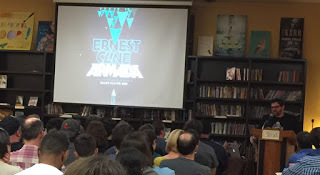 Ernest Cline speaks at Flyleaf Books in Chapel Hill, NC, 4/20/2016
Ernest Cline speaks at Flyleaf Books in Chapel Hill, NC, 4/20/2016
I'm a writer who isn't writing. For the last several weeks I've been in a rut, possibly due to the umpteen rejections I've been receiving, perhaps due to mental fatigue, perhaps due to a lack of motivation. This period follows an intensely productive period where I started and finished half a dozen stories, took a class, and attended a workshop.
Then, kablooey.
I hit the proverbial wall. My motivation dried up. My creativity went dormant.
Last night I may have gone and gotten myself all reinvigorated. I listened to Ernest Cline speak at Flyleaf Books in Chapel Hill, NC. If you're not familiar with him, you should know he's the author of Ready Player One, a fantastic book that is essentially Charlie and the Chocolate Factory except it involves virtual reality instead of a chocolate factory and the contestants must know all kinds of stuff about the 80's.
Cline told his "origin story". He grew up on a farm in the 80's in the same pop culture I did. He wrote a sequel to Buckaroo Banzai for fun. He wrote a movie entitled Fanboys about being a huge Star Wars nerd...and it got made! He wrote RPO, then sold the rights for both the novel AND the film within a 48-hour period! He set up a brilliant scavenger hunt contest with clues in his book but didn't tell anyone until the eve of its paperback release. The grand prize was a DeLorean. Stephen Spirlberg's directing the RPO movie. His second book, Armada, is a bestseller right now.
As I listened to him speak, I started to get a little annoyed about how much he was talking about himself. It then dawned on me that of course he was talking about himself because that's why the people came to see him speak (some drove as many as 5 hours). It then dawned on me that the reason I was getting annoyed was because I was straight up jealous! Ernest Cline is living my frickin' dream.
His talk was full of absolute joy, with the primary theme being, "Can you believe all this awesome stuff is actually happening to a schlub like me?"
At one point he stopped to say that he isn't able to write for some imaginary audience. He writes things that, as a reader, HE would find awesome and exciting and cool.
By golly, that's why I do it. That's what I'd forgotten. That's what I'm going to do again.
It's the joy, stupid.
Written April 20, 2016, but posted later due to life and reasons.
Published on May 01, 2016 17:59
StoryADay, Day 1
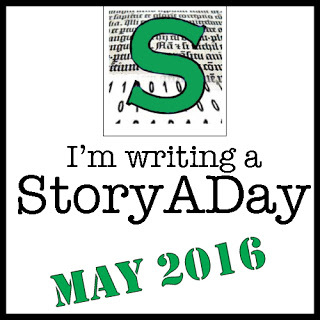
Tonight I started the StoryADay challenge. The challenge is to write a story every day for the month of May. Details can be found here.
The first challenge was to write a story in 30 minutes, about a character created with traits you like to read about. The story should explore the idea of something that character would never ever do, while putting them in a situation where they are faced with the choice of having to do that thing. All this must be accomplished in 30 minutes, no more.
I did it. I have a complete story that I'd say is a solid first draft. It may be one of the scariest things I've ever written. My character is one whose life is about taking care of kids. He's a Cub Scout Pack Leader, on a camping trip with his Pack. Things go horribly wrong and he has to make a terrible choice.
A couple of things I learned:
The StoryADay folks did a good job setting up a well-structured prompt. The time limit and the instructions on how to handle it were great.A story can be written in 30 minutes.I experimented with what I thought was Hemingway's suggestion to write drunk. As I researched to write this post, it looks like that quote might've been incorrectly attributed to him. In any event, a couple of whiskey shots followed by a nice glass of Frangelico shots seemed to do the trick for me. In fact, I'm writing this post while still slightly buzzed. Wheeee!!!I'm glad this started on a weekend. Who knows if I'll be able to actually pull this off for 30 days straight, but we'll see. Right now, I'm stoked.
Published on May 01, 2016 17:45
March 18, 2016
I Do My Best Thinking When I'm A Whiny Bitch
For most of this week I've been sick with a very bad cold. It was one of those where I coughed so hard I pulled a gut muscle, was super tired but couldn't sleep, had a sore throat, wah wah waaaah, yadda yadda yadda.
During one of those semi-lucid napping-until-I-cough-my-butthole-loose periods, I tried to settle my mind by silently repeating the mantra, "That which does not kill us makes us stronger." Well, my unwell mind did what unwell minds do and gradually lost its grip on the original idea and added a little mental flem until I ended up saying to myself, "That which does not thrill us takes us longer."
In retrospect, it's actually kinda cool. In fact I think it's downright profound! Now why the fuck can't I do that shit when I'm sitting at my laptop?
During one of those semi-lucid napping-until-I-cough-my-butthole-loose periods, I tried to settle my mind by silently repeating the mantra, "That which does not kill us makes us stronger." Well, my unwell mind did what unwell minds do and gradually lost its grip on the original idea and added a little mental flem until I ended up saying to myself, "That which does not thrill us takes us longer."
In retrospect, it's actually kinda cool. In fact I think it's downright profound! Now why the fuck can't I do that shit when I'm sitting at my laptop?
Published on March 18, 2016 21:31
January 29, 2016
A win!
So this happened. I wrote a guest post for Writers Digest!
http://www.writersdigest.com/editor-b...
http://www.writersdigest.com/editor-b...
Published on January 29, 2016 03:37
January 2, 2016
Submitting the Heck Out of 2016
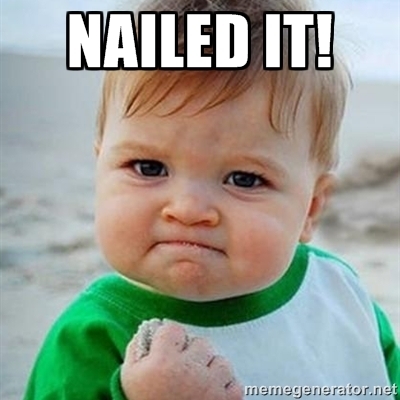
Yeah, so I just submitted two stories for publication today. "Meanwhile, at the End of the World..." is the story that didn't win the Writers Digest Popular Fiction Awards. I sent that to Tor.com, continuing to aim high instead of wallowing in my self-pity. "Save Often" is the story I wrote after my Christmas story crashed and burned thanks to technology. I sent that to Daily Science Fiction.
Can't wait to get those rejection notices! Keep your fingers crossed!
Happy New Year
Published on January 02, 2016 13:59
December 14, 2015
Epic Literature and Superheroes
Stephen King once said that he wrote The Stand out of his desire to write an epic comparable to Tolkien's The Lord of the Rings. Dune is one of the greatest epics in science fiction literature. I love all of these books and the idea of epic literature in unfamiliar settings.
I have often wondered if there's a place in literature for an epic story about superheroes. I believe the world of comic books have given us plenty of epic storylines, but I'm more interested in a fat novel. Is there a place for a sprawling, original work of epic fiction about superheroes? Something that contains the common elements of epic stories like Dune, LOTR, and The Stand? Something that will stand the test of time, be taught in classrooms, and become part of our collective consciousness?
I would SO like to write something like that.
I have often wondered if there's a place in literature for an epic story about superheroes. I believe the world of comic books have given us plenty of epic storylines, but I'm more interested in a fat novel. Is there a place for a sprawling, original work of epic fiction about superheroes? Something that contains the common elements of epic stories like Dune, LOTR, and The Stand? Something that will stand the test of time, be taught in classrooms, and become part of our collective consciousness?
I would SO like to write something like that.
Published on December 14, 2015 19:07
December 1, 2015
How I'm Using the Snowflake Method for my Christmas Story
The ProblemI'm writing a story. I've put in a few hours already, and I'm up to about 2500 words, but I'm still in the beginning. This is a problem because I'm used to writing very short stories and I still have a lot more story to go. This overwhelmed me.
 I was overwhelmed.What's DifferentWhen I wrote those stories before, I knew ahead of time that I was going to keep them short. Sometimes I had a specific word count target, sometimes I had a general word count target, sometimes I just had a distinct understanding of how long it should take the story to be told. This time, however, I don't have any of that. I'm writing a parody of stories like Divergent and The Hunger Games, so I've got a clear understanding of the big events and tropes of the story. I'm also refraining from limiting the size of the story. I'm going to let it be whatever it needs to be.
I was overwhelmed.What's DifferentWhen I wrote those stories before, I knew ahead of time that I was going to keep them short. Sometimes I had a specific word count target, sometimes I had a general word count target, sometimes I just had a distinct understanding of how long it should take the story to be told. This time, however, I don't have any of that. I'm writing a parody of stories like Divergent and The Hunger Games, so I've got a clear understanding of the big events and tropes of the story. I'm also refraining from limiting the size of the story. I'm going to let it be whatever it needs to be.
A side effect of this is, compared to my more recent projects, I'm doing a lot of writing but not getting very far. I was quite aware that this is to be expected, but I still felt like I was drowning.
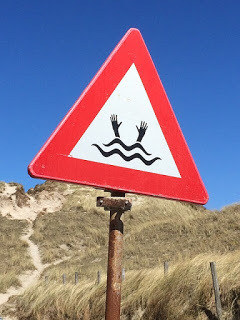 It was like I was drowning in too much story.
It was like I was drowning in too much story.
The Snowflake MethodWhile doing the Writers Digest Platform Challenge in October, I ran across the article, "The Snowflake Method For Designing A Novel" by Randy Ingermanson, Ph.D. This article described an iterative approach to writing a novel. You begin with a single sentence describing what the story is about, then a paragraph fleshing out those ideas, then several paragraphs describing your characters, and eventually adding more and more levels of complexity until you end up with a novel. From a graphical perspective, Ingermanson describes the single-sentence step as a triangle, while the final product has become exponentially more complex at each side, resulting in a snowflake design.
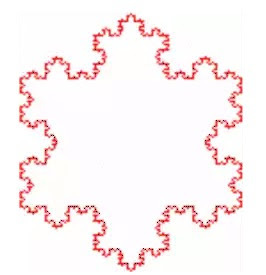 Ingermanson's Snowflake Illustration
Ingermanson's Snowflake Illustration
When I saw this the first time, I suspected this might be helpful for me since I have a bad habit of starting really cool writing projects, only to abandon them out of a sense of fatigue when the logistics of tracking details become too much for me to handle.
Where I Am NowIn one sitting, I went through the first two steps of the Snowflake Method--the one-sentence summary and the one-paragraph summary--and got knee deep into the third step, which fleshes out characters in detail by giving them their own one-sentence summary, motivations, goals, challenges, epiphanies, and ultimately a one-paragraph summary.
Before I started using the method, I had a clear understanding of what my story was going to do, but not much of an understanding of why. Now, I know the major players much better. I understand where the story is going next and why it feels like the beginning is taking so long to write (this is ok, it's not going to be a Very Short Story). Best yet, I have a much better understanding of how I'm going to tackle most of the big chunks of the story.
I'm looking forward to investigating the subsequent steps of the Snowflake Method. From what I can tell, it's really going to help me stay focused and not get lost in the details. This story might not be a novel in the end, but the principals behind this method still apply.
Then there's the fact that the story is a Christmas story. And I'm using the Snowflake Method to write it. Snow's usually associated with Christmas. Cuz it's Winter'n'stuff. And that's funny.
 I was overwhelmed.What's DifferentWhen I wrote those stories before, I knew ahead of time that I was going to keep them short. Sometimes I had a specific word count target, sometimes I had a general word count target, sometimes I just had a distinct understanding of how long it should take the story to be told. This time, however, I don't have any of that. I'm writing a parody of stories like Divergent and The Hunger Games, so I've got a clear understanding of the big events and tropes of the story. I'm also refraining from limiting the size of the story. I'm going to let it be whatever it needs to be.
I was overwhelmed.What's DifferentWhen I wrote those stories before, I knew ahead of time that I was going to keep them short. Sometimes I had a specific word count target, sometimes I had a general word count target, sometimes I just had a distinct understanding of how long it should take the story to be told. This time, however, I don't have any of that. I'm writing a parody of stories like Divergent and The Hunger Games, so I've got a clear understanding of the big events and tropes of the story. I'm also refraining from limiting the size of the story. I'm going to let it be whatever it needs to be. A side effect of this is, compared to my more recent projects, I'm doing a lot of writing but not getting very far. I was quite aware that this is to be expected, but I still felt like I was drowning.
 It was like I was drowning in too much story.
It was like I was drowning in too much story.The Snowflake MethodWhile doing the Writers Digest Platform Challenge in October, I ran across the article, "The Snowflake Method For Designing A Novel" by Randy Ingermanson, Ph.D. This article described an iterative approach to writing a novel. You begin with a single sentence describing what the story is about, then a paragraph fleshing out those ideas, then several paragraphs describing your characters, and eventually adding more and more levels of complexity until you end up with a novel. From a graphical perspective, Ingermanson describes the single-sentence step as a triangle, while the final product has become exponentially more complex at each side, resulting in a snowflake design.
 Ingermanson's Snowflake Illustration
Ingermanson's Snowflake IllustrationWhen I saw this the first time, I suspected this might be helpful for me since I have a bad habit of starting really cool writing projects, only to abandon them out of a sense of fatigue when the logistics of tracking details become too much for me to handle.
Where I Am NowIn one sitting, I went through the first two steps of the Snowflake Method--the one-sentence summary and the one-paragraph summary--and got knee deep into the third step, which fleshes out characters in detail by giving them their own one-sentence summary, motivations, goals, challenges, epiphanies, and ultimately a one-paragraph summary.
Before I started using the method, I had a clear understanding of what my story was going to do, but not much of an understanding of why. Now, I know the major players much better. I understand where the story is going next and why it feels like the beginning is taking so long to write (this is ok, it's not going to be a Very Short Story). Best yet, I have a much better understanding of how I'm going to tackle most of the big chunks of the story.
I'm looking forward to investigating the subsequent steps of the Snowflake Method. From what I can tell, it's really going to help me stay focused and not get lost in the details. This story might not be a novel in the end, but the principals behind this method still apply.
Then there's the fact that the story is a Christmas story. And I'm using the Snowflake Method to write it. Snow's usually associated with Christmas. Cuz it's Winter'n'stuff. And that's funny.
Published on December 01, 2015 18:43
November 30, 2015
Save Often
Published on November 30, 2015 19:47
November 22, 2015
Progress on Christmas Dystopia
Started writing my YA dystopian Christmas story today. 1300 words and a general outline so far.
Published on November 22, 2015 16:37
Stuff I Put In My Head
Robert Pipkin's blog about the stuff he reads.
Robert Pipkin's blog about the stuff he reads.
...more
- Robert Pipkin's profile
- 10 followers




